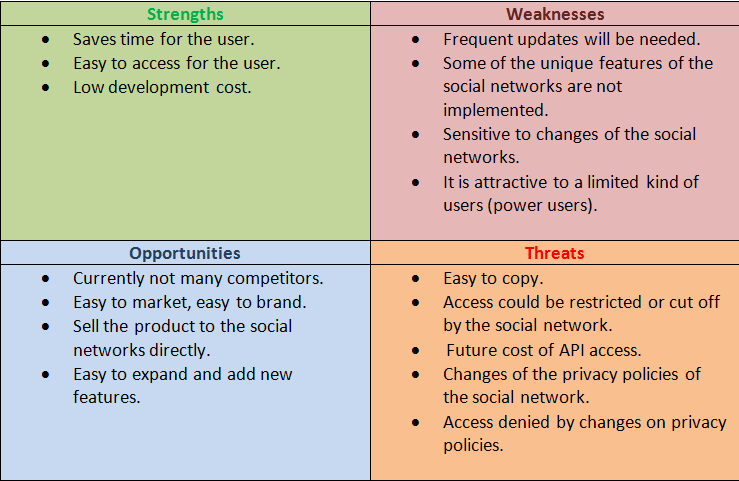Archive for May 11th, 2012
Last but not the least Blog: For Dragon Den Pitch
Posted by dingran in For Dragon Den Pitch on May 11, 2012
Acknowledgement: Really appreciate Connor McCabe, our group mentor, and our critical friend, Gemma Fitzsimmons. They contributed very good suggestions and references for our project. Without their help, it can’t be such excellent for our project. And also thanks everyone who responded our survey and leave comments on our blog.
Welcome to Webbers’ blog, in this Portfolio, our group collaborated developing a universal client for social network user, as it named ‘Uni4one’ (Universal all social networks for one client)
Uni4one can be simply summarised as a client has following features:
Please refer to product design and analyse for more details, and we also presented some simple User Interface pictures on ShowCase Page.
In one word, we aimed to design Uni4one as a client which is able to smoothly send, update, search information across different social networks, that is the core features of our product.
Please refer to our project proposal and StoryBoard to see what advantages and amazing features that a universal client has.
We also did some market and profit research, please refer to our Market Evaluation part for more details
Some technical Digram designed by our group member, to demonstrate how the client works.
Finally, we also have some research articles about privacy issues (Legal Research) and similar product analysis (Research Case). Hope you would spend some time on reading it.
Many thanks for your visiting.
Power Users
Posted by Petros Kagkas in Market Evaluation, Social Impact on May 11, 2012
Who are power users?
According to Webopedia power user is a sophisticated user of personal computers. A power user is typically someone who has considerable experience with computers and utilizes the most advanced features of applications [1].
According to Wikipedia a power user is a user of a personal computer who has the ability to use advanced features of programs which are beyond the abilities of “normal” users, but is not necessarily capable of programming and system administration [2].
Power users can be our initial target group that can be used as a vehicle to make our application widely known. Due to the fact that a small number of users can create a significantly large amount of content of the overall amount that is created by the other users. Specifically a study on twitter found that “fifty per cent of all tweets read and shared on Twitter were generated by only 20,000 ‘elite’ users, despite there being more than 100 million registered accounts on the service” [3]. Later on another study regarding facebook illustrated a similar behavioral pattern of the facebook power users [4]. More analytically the report states

On average 140 million tweets are sent a day, which is up nearly 100 million on the amount posted on a daily basis a year ago
Most people using the social network receive more interactions, such as ‘likes’ or being tagged in photos, than they give out on the site.
A new study entitled: ‘Why Most Facebook Users Get More Than They Give’, from Pew Internet, an American not-for-profit research firm, found that people ‘liked’ other Facebook members’ content an average of 14 times, while their own content was on average ‘liked’ 20 times.
Twelve per cent of Pew’s study participants, over the course of a month, tagged friends in photos, but then 35 per cent were themselves tagged in minimum of one photo. On average they sent nine personal messages and received 12. Forty per cent of them made a ‘friend request’, while 63 per cent received one in that time.
“First, it turns out there are segments of Facebook power users who contribute much more content than the typical user,” explained Professor Keith Hampton, the lead author of the report.
“Most Facebook users are moderately active over a one month time period, so highly active power users skew the average. Second, these power users constitute about 20 per cent to 30 per cent of Facebook users, but the striking thing is that there are different power users depending on the activity in question. One group of power users dominates ‘friending’ activity. Another dominates ‘liking’ activity. And yet another dominates photo tagging.”
References
SWOT Analysis
Posted by Petros Kagkas in Market Evaluation on May 11, 2012
We conducted a SWOT analysis in order to illustrate and evaluate the strengths, weaknesses, opportunities and threats involved in our project.




